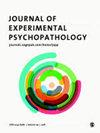习惯-目标框架的实验测试:抑郁症反刍与消极思维的习惯性特征增强有关,但与习惯导向的行为控制无关
IF 1.9
4区 医学
Q4 PSYCHIATRY
引用次数: 1
摘要
习惯性思维可能是对负面情绪进行反思的强化倾向的基础,这是一个被广泛接受的概念,很少受到直接测试。本研究的目的是调查沉思是否与习惯属性有关,以及它是否与习惯相对于目标导向行为控制的失衡有关。大学生(N=115)完成了自我报告问卷、沉思诱导范式和测量习惯性与目标导向行为控制的结果贬值任务。消极思维的更大习惯性特征(如自动性、缺乏意识、控制和意图)与沉思沉思有关,但与沉思反思无关,并预测沉思诱导后更持久的烦躁情绪。然而,反刍并不总是与习惯与目标导向行为控制的不平衡有关。这些发现表明,抑郁的脆弱性可能是习惯性地(在没有意识或意图的情况下)引发的沉思,对情绪产生有害影响。尽管是习惯性的,但相对于目标导向的行为控制,沉思可能与习惯失衡无关。这些发现为当前反刍的理论描述提供了支持,并为寻找有助于反刍成为一种习惯的特定因素设定了重要的边界条件。本文章由计算机程序翻译,如有差异,请以英文原文为准。
An experimental test of the habit-goal framework: Depressive rumination is associated with heightened habitual characteristics of negative thinking but not habit-directed behavior control
Habitual thinking may underpin a heightened disposition to engage in rumination in response to negative mood, a widely held notion that has rarely been directly tested. The purpose of the current study was to investigate whether rumination is associated with habitual attributes and whether it is related to an imbalance in habit relative to goal-directed behavior control. University students (N=115) completed self-report questionnaires, a rumination induction paradigm and an outcome devaluation task that measures habitual vs goal-directed behavior control. Greater habitual characteristics of negative thinking (e.g., automaticity, lack of conscious awareness, control, and intent) were associated with ruminative brooding but not ruminative reflection and predicted more persistent dysphoric mood following rumination induction. Rumination was not, however, consistently associated with an imbalance in habit versus goal-directed behavior control. These findings indicate that depression vulnerability may be in the form of rumination being habitually triggered (without awareness or intent) with deleterious effects on mood. Although habitual, rumination may not be related to an imbalance in habit relative to goal-directed behavior control. These findings provide support for current theoretical accounts of rumination and set important boundary conditions in the search for specific factors that contribute to rumination as a habit.
求助全文
通过发布文献求助,成功后即可免费获取论文全文。
去求助
来源期刊

Journal of Experimental Psychopathology
Medicine-Psychiatry and Mental Health
CiteScore
2.00
自引率
0.00%
发文量
19
审稿时长
11 weeks
期刊介绍:
The Journal of Experimental Psychopathology (EPP) is an open access, peer reviewed, journal focused on publishing cutting-edge original contributions to scientific knowledge in the general area of psychopathology. Although there will be an emphasis on publishing research which has adopted an experimental approach to describing and understanding psychopathology, the journal will also welcome submissions that make significant contributions to knowledge using other empirical methods such as correlational designs, meta-analyses, epidemiological and prospective approaches, and single-case experiments.
 求助内容:
求助内容: 应助结果提醒方式:
应助结果提醒方式:


